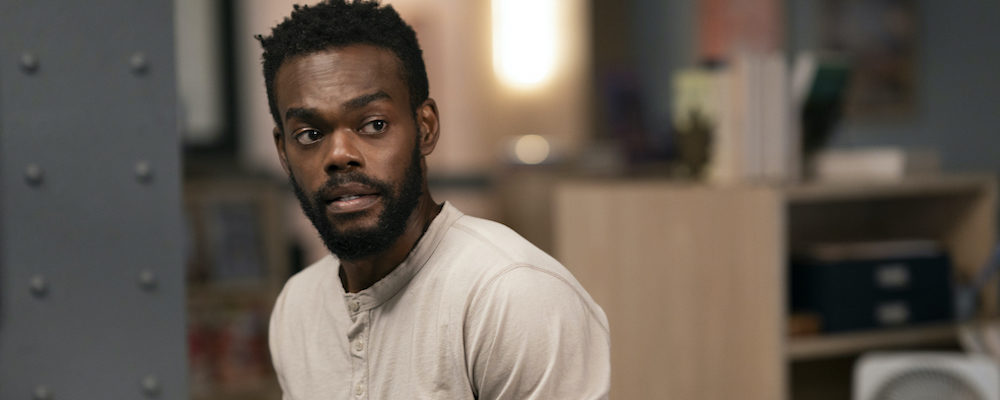‘Love Life’ Season 2 Searches for Romance Within the Black Millennial Experience
Alci Rengifo
To live and love as a millennial remains the ultimate metaphysical challenge in HBO Max’s “Love Life.” Circumstances these days has most everyone focusing on bigger issues, but if you’re a young professional in “Love Life,” it’s the heart that is constantly under the threat. Last season it was Anna Kendrick who the series followed through the trials and tribulations of finding “the one,” a concept that is elusive to all generations. In this much stronger second season, William Jackson Harper carries the series into richer terrain, exploring universal themes of seeking love mingled with the Black American experience.
There is a small link to last season in that we first meet New Yorker Marcus Watkins (Harper) at the wedding reception of Darby (Kendrick), who seems to have finally found marital bliss. Marcus is in a shakier situation with wife Emily (Maya Kazan). They are an interracial couple living in what seems to be deceptive middle class stability. Marcus is a book editor who makes a “high five figures” but feels a hard to pinpoint emptiness. Emily’s a great person, but the marriage seems to be running out of fire. At the party Marcus meets Mia (Jessica Williams), who has a boyfriend who seems to be out of town all the time. They strike a friendship that Marcus begins to suspect is developing into a deeper attraction. The pair instantly click. Is it because they are both Black and Marcus has been married so long to a white woman? Or is it simply because he’s looking for any way out of a failing marriage? When Emily finds all of the texts between Marcus and Mia, she wants a divorce, which Marcus almost gratefully accepts.
The divorce is merely the starting point of Marcus’s greater journey. Showrunners Bridget Bedard, Rachel Williams and Paul Feig could have easily repeated the formula of the first season. What they do is keep the anthology fresh by going a different narrative route. They switch the gender and ethnicity of the main character as well as the nature of the quest. While Kendrick’s Darby was trapped in a dating wheel looking for the perfect match, Harper’s Marcus has already lived a few years married to who he thought was his ultimate match. The writing finds funny and subtle ways to hint at his growing insecurities. When a new young author, who has penned an Afrofuturism novel about a world where Haiti was never colonized, calls him out as a sellout and compares him to Obama, Marcus is almost shaken by Emily trying to agree in a “you should take it as a compliment” mode. There are also those moments of personal humiliation, like when Marcus, now single, tries to move ahead with Mia but she makes it clear she really does want to be friends.
Much of the first half of this season is about Marcus’s attempts to adjust to single life as a millennial in his 30s who would still like to find a good partner. Soon enough, he’s trapped in some of those dicey moments that happen when confusion clouds your judgement. A darkly comic episode finds him going to the dorm of a college senior, resulting in a hilarious sex scene. In another episode he visits his parents in Michigan and hooks up with an old high school classmate. He might not be interested in anything deeper, but she also forgets to mention a hot-tempered, bat-wielding boyfriend. The supporting cast is very strong with potential love interests played by Williams, Ego Nwodim, Yasha Jackson and Sasha Compère, among others. It’s great to see Janet Hubert, the original Aunt Vivian from “The Fresh Prince of Bel-Air” return to the screen as Marcus’s mother, who seems too eager to push him into the dating game again. Punkie Johnson provides a more confident sibling to Marcus as his lesbian sister Ida, who still has to warn her girlfriend to stop trying to sell her hand-made soap at a family gathering.
“Love Life” is an anthology series that also captures the middle class millennial mindset precisely. This season explores themes of Black love, but through the experiences of a college-educated editor who never stopped looking and talking in a collegial manner. Even the narration by Ketih David opens the season with lines like, “Marcus Watkins had always adapted as a means of survival, carefully constructing chameleonic variations of himself in order to present a certain façade to the world. As a result, his own impulses were often shrouded in a fog of self-consciousness.” We get it, the screenwriters graduated from USC. But that is also the kind of personality being profiled here. As in the first season, Marcus is a character navigating a world of tech jobs and well-paying editorial positions, where having married his college sweetheart might be seen as having married too young. It is as if after the divorce, he is a free agent for the first time ever in his life, but that doesn’t mean dating will get any easier. The writing never suggests that an interracial marriage doesn’t fit. It surely does, if both partners are compatible in those mysterious ways all would-be lovers seek. Even when Marcus decides to date Black women, the challenges don’t cease because everyone brings baggage and hesitation born out of past relationships. “Love Life” is about romance for a particular generation, but the prickly thorns and joys are surely relatable to everyone.
“Love Life” season two begins streaming Oct. 28 with new episodes premiering Thursdays on HBO Max.

